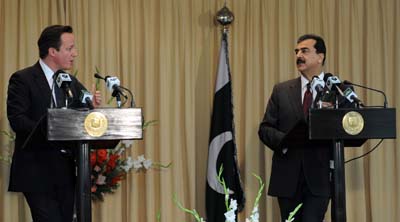Amid political tumult in Islamabad, Pakistani Prime Minister Yousuf Raza Gilani and a team of six ministers are in London for far-ranging meetings today through May 13. The Pakistan-U.K. Enhanced Strategic Dialogue will review education, health, defense, security, and cultural cooperation. CPJ has written a letter to Prime Minister David Cameron to urge that press freedom conditions be raised as well.
As we pointed out, Pakistan has been the world’s deadliest country for journalists for two consecutive years. That record reflects fatalities from both dangerous assignments and targeted murders.
In only one of the 20 journalist murder cases since January 2002 have any of the perpetrators been brought to justice. The partial exception is that of the American reporter for The Wall Street Journal, Daniel Pearl, in which some of the people involved in his abduction and beheading were eventually brought to trial. This abysmal record makes Pakistan one of the worst countries in the world in combating deadly anti-press violence, according to CPJ’s 2012 Impunity Index.
Twelve others have been killed since 2002 while covering dangerous assignments. They lacked the protective gear and safety training that are standard in many places in the world. Given those hard realities, here are some suggested issues that could get a jump-start at the London sessions. They come from discussions I’ve had with Pakistani journalists over the last few years:
In the context of defense and security cooperation, Britain could offer Pakistan assistance in reversing impunity in the killings of journalists. These murders have been attributed to government officials, criminal gangs, wealthy business owners, and militant groups. Assistance to local police investigators working on these unsolved cases–coupled with a commitment to increase the forensic capabilities of local and national police–would go far in protecting journalists. Increased law enforcement capacity is also in the interest of the broader public.
As for those journalists covering dangerous assignments, Britain could offer two forms of assistance that would have immediate impact:
- Getting helmets, body armor, and other protective gear into the hands of at-risk journalists would be an immediate and cost-effective way of protecting lives. In the past, there have been problems getting this gear through Pakistani customs, an issue that could be resolved by the talks in London.
- By helping bear the cost of security training to individual journalists–and preparing Pakistani trainers to pass on that knowledge to the larger press corps–British aid could go far in saving lives. Journalist organizations and media companies have taken steps to improve training, but more assistance is needed.
And here is one other proposal: In cooperation with international aid donors and partnering with a Pakistani academic institution of appropriate stature, Britain could help launch a graduate school of journalism in Pakistan. Many newsroom managers say they are hiring journalism students who are eager but not fully prepared. The problem is partly caused by the explosion of demand; Pakistani media has been going through a protracted period of growth for quite a while. But many of Pakistan’s media and communications schools don’t seem to have the budgets or the programs, in English, Urdu, or Pashto, to meet the industry’s demand for newsroom-ready reporters. And if that graduate school of journalism should also host a journalists’ safety training program, who would find fault with that?
